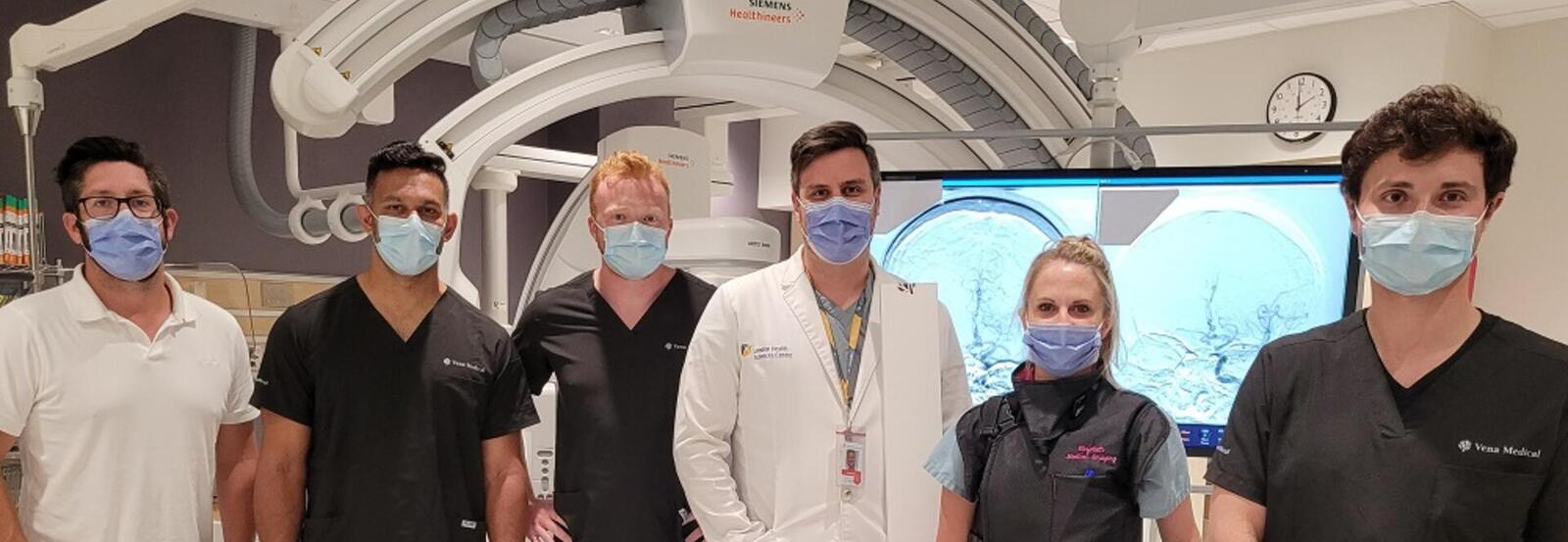Editor:
Brandon Sweet
University Communications
bulletin@uwaterloo.ca
Lynda McCutcheon retires after four decades
A message from the Office of Research.
Lynda McCutcheon, Manager for Research Partnerships in the Office of Research (NSERC Partnership Programs) is retiring on November 1, 2022, after more than 45 years at the University of Waterloo, however, she will be leaving campus on August 23, 2022, for some well-deserved vacation time.
A career that began in 1975, Lynda has worked her way up the ladder through payroll and finance and found her place in the Office of Research in 1997. Although she took a break to have a family, she always kept one foot in the door at Waterloo covering maternity leaves, job sharing and working short and long-term contracts.
When she returned to the Office of Research in September 1997 as full-time permanent staff, she worked in research finance for a time (which she thoroughly enjoyed) and then moved to pre-awards, her most recent, and final position at Waterloo.
Lynda has seen a lot of change over the years. For example, what is now the Office of Research was once known as Waterloo Research Institute; only approximately 25 people worked for the Office of Research when she started, and it now employs over 150. “The university was very small and has grown immensely over the years, and I have worked for many different presidents,” she says. To put her years of service into perspective, Burt Matthews was the president of Waterloo when she was hired.
When asked what has kept her at the University for so long, she simply stated, “The people.” She has enjoyed her career at Waterloo and has loved getting to know people across campus and developing relationships over time. She especially enjoyed working closely with researchers across all faculties and learning about what they are researching. It was also extremely important to her that applications were successful, and she worked closely with the researchers for them to be successful.
It is the people she has met over the years that Lynda will miss the most. She will certainly miss the Office of Research social activities, especially the potlucks and fun which was had by all.
Her retirement plans are also simple. Lynda wants to spend more time with her grandchildren, and once she has taken some time for rest and relaxation, she would like to do some further photography and volunteer, perhaps at the local food bank since the need is greater today than ever before.
Lynda’s parting words to her colleagues at Waterloo, “Good luck to everyone and all the best in the future at Waterloo.”
When every second counts

Michael Phillips, third from left, and Phillip Cooper, right, of Vena Medical pose with a colleague and medical officials at the London Health Sciences Centre in London after the first use of a new device to remove blood clots in the brains of stroke victims.
By Brian Caldwell. This article was originally published on Waterloo News.
A medical technology company launched by two Waterloo Engineering graduates is making news this week with the announcement that a device it developed has been successfully used to treat stroke victims.
Vena Medical, which grew out of a Capstone Design project by Michael Phillips and Phillip Cooper when they were classmates in the mechanical engineering program, earned Health Canada approval earlier this year for hardware it calls the Vena Balloon Distal Access Catheter (BDAC).
Now the device has been used by surgeons at hospitals in London and Ottawa to remove blood clots and restore blood flow as quickly as possible for five patients.
“We’re proud to have the first patients to benefit from our Canadian-developed technology within driving distance of our office, in the hands of world-class physicians,” said Phillips, CEO of the Kitchener-based company, in a media release.
“This is cutting-edge technology that would normally need to be launched somewhere far from here, but we’re excited to make an impact locally before we make an impact globally.”
Doctors raved in media releases about the effectiveness of the device, which combines a balloon guide catheter and a distal access catheter to get closer to blood clots in the brains of stroke victims during surgery to remove them.
An inflatable balloon temporarily restricts blood flow while surgeons use tools to remove clots, increasing the chances of success on the first attempt. Other advantages over existing, separate devices include better patient outcomes and reduced costs.
New device 'isn't even comparable' to competitors
“The BDAC isn’t even comparable to the competitors,” said Dr. Sachin Pandey, who used the device alongside Dr. Michael Mayich at the London Health Sciences Centre-University Hospital.
“The Vena BDAC is a category-defining device and we’re excited to be the first in the world to evaluate its performance,” said Dr. Robert Fahed of The Ottawa Hospital. “Each case has been successful so far with the BDAC getting the clot out on the first try, every time.”
The first time the device was used in late June, a clot was removed from the brain of stroke victim Wilene Leyen in less than 10 minutes by Mayich and his team. Her movement and speech were restored almost immediately.
“I can do almost everything I was able to do before I suffered the stroke and I’m very grateful Dr. Mayich was able to perform this procedure,” Leyen said in a release.
Phillips met with the Goderich woman for the first time this week and said it was difficult to put into words how much it meant to him to see how well she is recovering.
'Seconds count' during stroke surgery
“When a blood clot is causing a stroke, over two million brain cells can be lost each minute, so seconds count,” Mayich said. “By locating and removing the clot in a shorter period of time, the patient has a higher probability of regaining mobility and speech.
“This device offers the possibility of removing clots in fewer attempts, shortening the procedure and maximizing the chances of good outcomes for our patients.”
Phillips and Cooper initially worked out of the Velocity startup incubator at the University of Waterloo, and secured financial backing from several entrepreneurship programs at Waterloo Engineering to pursue commercialization of their student project after they graduated in 2017.
The Vena BDAC developed out of the company’s flagship product, a tiny camera – billed as the world’s smallest – to allow doctors to see inside veins and arteries during stroke surgery.
The company is now based at the Medical Innovation Xchange in Kitchener and has eight employees.
Study confirms that speculation taxes are not an effective tool in curbing house prices

As the Ontario housing market enters a potentially volatile phase, new research from the University of Waterloo shows how tax policy has proven ineffective in controlling prices.
The report specifically looked at market behaviour of the nine largest Ontario population centres between 2011 and 2021 — a time of significant price increases across the province.
“Every city in Ontario hopes to regulate its own housing market as part of its duty to its citizens,” said Olaf Weber, a researcher in Waterloo’s School of Environment, Enterprise, and Development. “We found that quite often such policies are ineffective partially due to factors out of their control.”
The study points to how both geography and our three-tiered governance system both play a role in diminishing municipal efforts to regulate housing prices with taxation. For instance, speculation taxes, such as Ontario Non-Resident Speculation Tax, rarely dissuades large-scale investors from purchasing property and leaving it vacant.
“This phenomenon is most present in the largest cities, and taxes like these really only represent a marginal change in profits for most large investors,” Weber said. “They’ll either pay the tax, or they’ll move to the next closest city and buy there.”
The researchers call this the “spillover effect.” “Cities like Toronto are so desirable there is very little they can do to regulate their market, and are so big, neighbouring cities are at the mercy of what happens there,” Weber said.
According to the study, changes to other tax-related measures such as land-transfer taxes, and property taxes, have also proven to be largely ineffective in curbing prices as any stability from the well-intentioned measures can be wiped out by an interest rate change at the federal level, or a policy change provincially.
“Municipalities are frustrated,” Weber said. “I am not sure what they can do when so many factors are playing against each other. Empirically, the only thing that has worked to create affordable housing is when cities buy, build, or manage properties themselves and set the price.”
The study, authored by Weber and PhD student Muhammad Adil Rauf also of Waterloo’s Faculty of Environment, was recently published in the journal Sustainability.
Winners of Faculty of Mathematics 2022 Awards for Distinction in Teaching named

This article was originally published on the Faculty of Mathematics website.
Nathaniel Stevens from the Department of Statistics and Actuarial Science and Mohammad Kohandel from the Department of Applied Mathematics have been named winners of this year’s Awards for Distinction in Teaching from the Faculty of Mathematics.
The annual teaching award goes to faculty members who have consistently demonstrated outstanding pedagogical skills and a deep commitment to students. The winners are honoured by a public citation along with a cash prize.
The award announcement was made by Diana Skrzydlo, the Faculty of Mathematics teaching fellow.
One of this year’s two award winners, Nathaniel Stevens is an Assistant Professor in the Department of Statistics and Actuarial Science.
Nathaniel is committed to educating students both inside and outside the classroom. He frequently runs a “Get a Job 101” session, helping students navigate salary negotiation and setting them up for successful careers, and is generous with his time and advice.
Throughout the pandemic, Nathaniel’s community-building and engagement in his online courses was exemplary. Almost 100 students provided comments to the committee on his caring, compassion, and organization. He uses the messaging platform Slack to provide a space for students to discuss the course material, raise awareness of larger statistical issues, and even share pictures of their pets.
Another of this year’s two award winners, Mohammad Kohandel is an Associate Professor in the Department of Applied Mathematics.
Mohammad has taught a wide variety of students and had an enormous impact on them. In addition to his own teaching, his work on curriculum and course notes reaches beyond his own courses.
Letters from Mohammad’s students praise his efforts in creating an inclusive and welcoming environment in which to learn. He provides the opportunity for students at all levels from, first year to graduate, to engage with mathematical research, and encourages them to succeed.
Congratulations to both our recipients.
Beyond the Bulletin episode 135

The latest episode of the Beyond the Bulletin Podcast is now live. Math professor and Canada 150 Research Chair Anita Layton discusses using computer models to modernize medicine and detect adverse drug reactions earlier. IC3 becomes the Waterloo Climate Institute. Orientation, campus move-in and the University’s United Way Campaign seek volunteers. And registration is open for the Mental Health Literacy Certificate.
Upcoming office closure
The Health Services (HS) building will be closed from 2:00 p.m. to 4:30 p.m. today while the staff there attend training activities. Counselling Services in Needles Hall will continue operating during their regular hours.
Link of the day
When and Where to get support
Students can visit the Student Success Office online for supports including academic development, international student resources, immigration consulting, leadership development, exchange and study abroad, and opportunities to get involved.
Instructors looking for targeted support for developing online components for blended learning courses, transitioning remote to fully online courses, revising current online courses, and more please visit Agile Development | Centre for Extended Learning | University of Waterloo (uwaterloo.ca).
Instructors can visit the Keep Learning website to get support on adapting their teaching and learning plans for an online environment.
Course templates are available within your course in LEARN to help you build and edit your content and assignment pages quickly.
The following workshops, webinars, and events are offered by the KL team (CTE, CEL, ITMS, LIB):
-
Scholarship of Teaching and Learning (SoTL) Methods – self-directed, continuous self-enrollment course in LEARN.
-
Independent Blended Course Design (iBlend) - self-directed, continuous self-enrollment course in LEARN.
-
Copyright Overview for Waterloo Instructors and Staff - self-directed, continuous self-enrollment course in LEARN.
-
Independent Remote Course Design Essentials (iReCoDE) - self-directed, continuous self-enrollment course in LEARN.
-
Supporting Student Mental Health (for Instructors) – self-directed, continuous self-enrollment course in LEARN.
Supports are available for employees returning to campus. Visit IST’s Hybrid Work and Technology guidelines and workplace protocols to assist with the transition.
The Writing and Communication Centre has in-person and virtual services to support grad and undergrad students, postdocs and faculty with any writing or communication project. Services include one-to-one appointments, drop-ins at Dana Porter Library, online workshops, writing groups, English conversation practice, and custom in-class workshops.
Co-op students can get help finding a job and find supports to successfully work remotely, develop new skills, access wellness and career information, and contact a co-op or career advisor.
The Centre for Career Action (CCA) has services and programs to support undergrads, grad students, postdocs, alumni, and employees in figuring out what they value, what they’re good at, and how to access meaningful work, co-op, volunteer, or graduate/professional school opportunities. Questions about CCA's services? Live chat, call 519-888-4047, or stop by our front desk in the Tatham Centre 8:30 a.m. to 4:30 p.m., Monday to Friday.
Drop-in to Warrior Virtual Study Halls on Wednesdays from 5:30 p.m. to 7:00 p.m. Come together in this virtual space to set goals and work independently or in groups each week.
Renison's English Language Institute continues to offer virtual events and workshops to help students practice their English language skills.
If you feel overwhelmed or anxious and need to talk to somebody, please contact the University’s Campus Wellness services, either Health Services or Counselling Services. You can also contact the University's Centre for Mental Health Research and Treatment. Good2Talk is a post-secondary student helpline available to all students.
The Library is open with expanded hours for access to book stacks, drop-in individual study space, bookable group study rooms, drop-in access to computers and printers, book pick-up services and IST Help Desk support. Librarian consultations, Special Collections & Archives and the Geospatial Centre are available by appointment. Full details on current services and hours are available on the Library’s COVID-19 Update webpage.
The Faculty Association of the University of Waterloo (FAUW) continues to advocate for its members. Check out the FAUW blog for more information.
The University of Waterloo Staff Association (UWSA) continues to advocate for its members. Check out the UWSA blog for more information.
The Sexual Violence Prevention and Response Office (SVPRO) supports all members of the University of Waterloo campus community who have experienced, or been impacted, by sexual violence. This includes all students, staff, faculty and visitors on the main campus, the satellite campuses, and at the affiliated and federated Waterloo Institutes and Colleges. For support, email: svpro@uwaterloo.ca or visit the SVPRO website.
The Office of Indigenous Relations is a central hub that provides guidance, support, and resources to all Indigenous and non-Indigenous campus community members and oversees the University's Indigenization strategy.
The Waterloo Indigenous Student Centre, based at St. Paul’s University College, provides support and resources for Indigenous students, and educational outreach programs for the broader community, including lectures, and events.
WUSA supports for students:
Peer support - MATES, Glow Centre, RAISE, Women’s Centre - Click on one of the links to book an appointment either in person or online for the term.
Food Support Service food hampers are currently available from the Turnkey Desk 24/7 in the Student Life Centre. Drop-off locations are also open again in SLC, DC, DP, SCH, and all residences.
Co-op Connection all available online.
Centre for Academic Policy Support - CAPS is here to assist Waterloo undergraduates throughout their experience in navigating academic policy in the instances of filing petitions, grievances and appeals. Please contact them at caps@wusa.ca.
WUSA Student Legal Protection Program - Seeking legal counsel can be intimidating, especially if it’s your first time facing a legal issue. The legal assistance helpline provides quick access to legal advice in any area of law, including criminal. Just call 1-833-202-4571.
Empower Me is a confidential mental health and wellness service that connects students with qualified counsellors 24/7. They can be reached at 1-833-628-5589.
GSA-UW supports for graduate students:
The Graduate Student Association (GSA-UW) supports students’ academic and social experience and promotes their well-being.
Advising and Support - The GSA advises graduate students experiencing challenges and can help with navigating university policies & filing a grievance, appeal, or petition.
Mental Health covered by the Health Plan - The GSA Health Plan now has an 80 per cent coverage rate (up to $800/year) for Mental Health Practitioners. Your plan includes coverage for psychologists, registered social workers, psychotherapists, and clinical counselors.
Dental Care - The GSA Dental Plan covers 60 to 70 per cent of your dental costs and by visiting dental professionals who are members of the Studentcare Networks, you can receive an additional 20 to 30 per cent coverage.
Student Legal Protection Program - Your GSA fees give you access to unlimited legal advice, accessible via a toll-free helpline: +1-833-202-4571. This advice covers topics including housing disputes, employment disputes, and disputes with an academic institution.
The Graduate House: Open Monday to Tuesday 11:30 a.m. to 7:00 p.m. and Wednesday to Friday 11:30 a.m. to 9:00 p.m. We’re open to all students, faculty, staff, and community members. The Graduate House is a community space run by the GSA-UW. We’re adding new items to the menu. Graduate students who paid their fees can get discounts and free coffee.
When and Where (but mostly when)
Warriors vs. Laurier Blood Donation Battle. Join our “Waterloo Warriors” team on the Blood.ca website or app. #ItsInYouToGive
Warriors Youth Summer Day Camps, July 4 to September 2. Open to boys and girls age 5-18. Baseball, Basketball, Football, Hockey, Multi-Sport and Games & Volleyball. Register today.
Warriors Game Day Tickets and Season Passes, on sale now. Cheer on your Warriors W/M Basketball, Football W/M Hockey and W/M Volleyball teams at home during the 2022-23 season. Purchase today.
Warriors Men’s Basketball vs. Ferris State Bulldogs, Friday, August 26, 6:00 p.m., Carl Totzke Court, PAC. Purchase your tickets today.
Labour Day holiday, Monday, September 5, most University operations closed.
Deadline to register for Centre for Extended Learning (CEL) "Getting Ready to Facilitate Online Courses: TA Training – Fall 2022" course, Sunday, September 11.